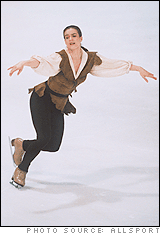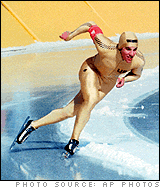Winter Olympics Trivia: Did You Know?

Fun Olympic facts for trivia buffs and novices
by Catherine McNiff and Beth Rowen
Test your trivia skills! Take the Did You Know quiz.  Katarina Witt Related Links |
Top Medal Winners
Cross country skier Bjorn Daehlie (Norway) has won the most medals of any athlete: 12 (eight gold; four silver).
Cross country skier Raisa Smetanina (USSR) is the winningest woman medalist, taking 10 medals (four gold; five silver; one bronze).
Speed skater Apolo Ohno leads the list of American medal winners at the Winter Games: eight (two gold; two silver; four bronze).
Speed skater Bonnie Blair is the winningest American woman medal winner at the Winter Games: six (five gold; one bronze).
Only two countries south of the equator have ever won medals at the Olympic Winter Games—Australia and New Zealand.
Winter and Summer Winners
Only four athletes have won medals in both the Winter and Summer Olympics:
- Eddie Eagan (U.S.): boxing gold (1920; summer) and four-man bobsled gold (1932; winter).
- Jacob Tullin Thams (Norway): ski jumping gold (1924; winter) and 8-meter yachting silver (1936; summer).
- Christa Luding-Rothenburger (East Germany): speed skating gold at 500 meters (1984; winter) and 1,000m (1988; winter), silver at 500m (1988; winter) and bronze at 500m (1992; summer) and match sprint cycling silver (1988; summer).
- Clara Hughes (Canada): individual road race cycling bronze and individual time trial cycling bronze (1996; summer) and 5,000 m speed skating bronze (2002; winter).
Christa Luding-Rothenburger is the only athlete to ever win medals in both Winter and Summer Games in the same year.
The Torch
In the torch relay that begins at the ruins of the Temple of Hera in Olympia and ends at the site of the Games, runners do not pass the same torch; only the flame is passed on to the next torchbearer. Each runner is allowed to keep their torch.
In 2014, one leg of the torch relay took place in space as two Russian cosmonauts carried the torch outside the International Space Station, some 200 miles above Earth.
Winter Olympics Through the Years
The Shea Family of Lake Placid, New York, is the first to produce three generations of Olympians. Father Jack, 91, was a double-gold medalist in speed skating, son Jim, Sr., was a U.S. ski team member at the 1964 Innsbruck Games, and in 2002 grandson Jim, Jr., won a gold medal in skeleton.
The 1956 Winter Games in Cortina d'Ampezzo, Italy, were the first to be televised. The 1968 Games in Grenoble, France, were the first to be broadcast in color.
Man-made snow was used in the Olympics for the first time at the 1980 Games in Lake Placid.
Computers were first used to tabulate results at the 1960 Games in Squaw Valley, California.
Freestyle Skiing
The word "mogul" comes from the Austrian word "mugel," which means "small hill" or "mound."
Figure Skating
The men's 2006 gold medal winner, Russian Yevgeny Plushenko, is the first skater in history to successfully land a quad-triple-triple jump combination in competition.
Curling
Curling is one of four winter Olympic sports contested indoors. The other three are hockey, figure skating, and speed skating.
Luge
German luge master Georg Hackl is the only athlete to medal in the same event in five straight games.
Nordic Combined
At the 2010 Games, Johnny Spillane won the United States' first medal in the nordic combined event.
Biathlon
The biathlon is the only Olympic Winter Games event in which the United States has never won a medal.
Skeleton
American Jennison Heaton won the first skeleton gold medal in 1928, beating his brother John, who took the silver, by one second. John Heaton, at age 39, went on to win the silver again in 1948, finishing second to Italy's Nino Bibbia. American Jim Shea, Jr., won the men's gold in the 2002 return of the sport to the Olympics. The 2002 Salt Lake City Games also witnessed the debut of women's skeleton.
Ice Hockey
Ice hockey made its Olympic debut at the 1920 Summer Olympics in Antwerp, Belgium. The first Winter Olympics didn't take place until 1924.
Speed Skating
At the 2006 Turin Olympics, American Shani Davis became the first African-American athlete to win gold in an individual event, the 1,000 m. He also took home silver in the 1,500 m event. Davis is the tallest American speed skater, standing at 6'2" tall.
Alpine Skiing
American skier Lindsey Vonn was awarded a cow by local dairy farmers for her World Cup win in Val D'Isere, France, in 2005. She had a choice between the cow or an additional $1,200 in prize money. She went with the cow.
Bobsled
It's been 26 years since the Jamaican bobsled team made its debut at the Olympics.
Ski Jumping
The oldest man to receive a Winter Olympics medal is 83-year-old Anders Haugen. The Norwegian-American actually received his ski jump bronze medal 50 years after he competed in 1924 when a scoring error was discovered in 1974.
Wisconsin
Legends Eric Heiden and Dan Jansen , as well as stars Chris Witty and Casey FitzRandolph, are from the same U.S. state, Wisconsin.
Norway
Norway has won more gold medals at the Winter Games than any other country.

